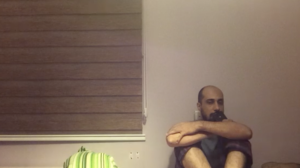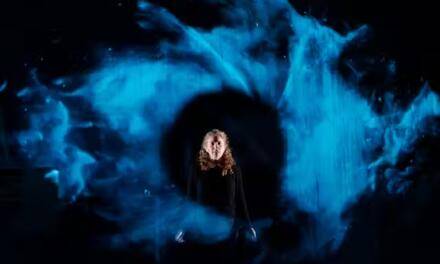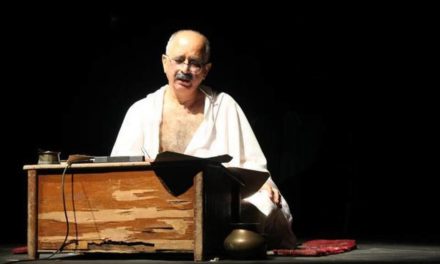It’s hard to prepare for life’s high and lows when you think too highly of yourself to expect them. You will bet on yourself, but you won’t hedge the pursuit of that dream with a surer, albeit less satisfying, option. It is the dream or nothing.
With Sarah Saberi’s UnTuned, we find ourselves on the nothing side of things for the story of a struggling musician and immigrant to Canada on his 40th birthday as he video calls with family and friends back in Iran.

UnTuned. Press photo.
Amir Hosein Taheri, as Massoud, the musician, brings a lighter air to the angst of unfulfillment, cracking jokes, often at others’ expense, to distract himself from confronting why his art did not work out as expected. His sulking posture and indifferent face, even at the happiest of moments, kept reminding me of Camus’ The Stranger, except somehow laced with hilarity, which is no small feat.
I think Massoud succeeds at keeping us interested in his lack of creative and romantic achievements because he can’t help brushing up against it, forcing himself to react. There are constant opportunities for self-reflection, most of which he swats away, but yet, he keeps answering birthday calls in search of more. I call that spirit and he has it in droves, even though he can’t always recognize how it shines through everything he does.
At its base, this play about failure in love and work is supported by love itself, made all the more intense by the distance between Massoud and his callers, though they are side by side on the screen. That mix of relief, longing and joy you get when you Zoom the right person is the fertile soil from which this story comes to light.
One pivotal scene concerns Banafsheh Taherian, as Atefeth, Massoud’s high-achieving friend, who stood out to me as an example of artifice adding to rather than subtracting from authenticity. Atefeth is a hyperbolic extension of everything Massoud might wish for, so much so she’s almost perfect, a statistical rational anomaly in a world of people all up in their feelings barely getting by. Her jovial effortless exceptionalism teaches us how very seriously Massoud takes her as a measuring stick for his own accomplishments, though he’d never admit it, setting him (and us) up for how unexplained expectations are always guaranteed disappointments.
Another key scene involves Farzaneh Soheili, as Bahareh, who offers us a heavy dose of badassery as, one by one, she throws Massoud’s put downs right back in his face. She pulls this off with vigor, questioning the foundations of the meaning in his life, savoring the pulls from her cigarette with a stiff upper lip as an action star might. The pair makes for a crescendo I found to be a satisfying payoff to Massoud’s broody soul-searching.

UnTuned. Farzaneh Soheili as Bahareh & Amir Hosein Taheri as Massoud. Press photo.
Every caller in UnTuned succeeds at reflecting Massoud back at himself at an angle he’s too stuck to tease out on his own. From his mother (Fariba Jedikar) to his sister (Faranak Kalantar) to his job interviewer (Ashley Mauerhofer), there are intimations of the great promise he can’t seem to reignite. And Saberi, as Director, does well to end things with a nod to self-care suggesting he may never be able to, and that’s OK, so long as he can have his own back once the inevitability of change comes calling.
If you’re interested in a character study that cycles you through the full scope of human emotion, you made it. You’re here.
UnTuned was part of Toronto’s Digital Fringe Festival until August 22, 2021. To watch the play on YouTube, click here.

UnTuned. Amir Hosein Taheri as Massoud. Press photo.
Credits
Cast:
( in order of appearance)
Amirhosein Taheri
Fariba Jedikar
Banafsheh Taherian
Faranak Kalantar
Ali Ghorbanian
Ashley Mauerhofer
Farzaneh Soheili
Director/playwright: Sarah Saberi
Production Manager/ Project Consultant: Leyla Shamshiri Rad
Music Director: Hesam Abedini
Translate: Parya Tahsini
Costume Designer: Leyla Shamshiri Rad
Production lead in Tehran: Peyman Fakhraee
Graphic Design: Parnaz Karimi
This post was written by the author in their personal capacity.The opinions expressed in this article are the author’s own and do not reflect the view of The Theatre Times, their staff or collaborators.
This post was written by Trevor Abes.
The views expressed here belong to the author and do not necessarily reflect our views and opinions.


















